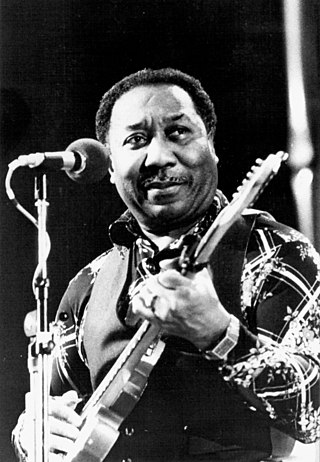
McKinley Morganfield, known professionally as Muddy Waters was an American blues singer, songwriter and musician who was an important figure in the post-World War II blues scene, and is often cited as the "father of modern Chicago blues". His style of playing has been described as "raining down Delta beatitude".

Chester Arthur Burnett, better known by his stage name Howlin' Wolf, was an American blues singer, guitarist and harmonica player. He was at the forefront of transforming acoustic Delta blues into electric Chicago blues, and over a four-decade career, recorded blues, rhythm and blues, rock and roll, and psychedelic rock. He is regarded as one of the most influential blues musicians of all time.
Chicago blues is a form of blues music that developed in Chicago, Illinois. It is based on earlier blues idioms, such as Delta blues, but is performed in an urban style. It developed alongside the Great Migration of African Americans of the first half of the twentieth century. Key features that distinguish Chicago blues from the earlier traditions, such as Delta blues, are the prominent use of electrified instruments, and especially the use of electronic effects such as distortion and overdrive.
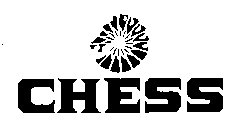
Chess Records was an American record company established in 1950 in Chicago, specializing in blues and rhythm and blues. It was the successor to Aristocrat Records, founded in 1947. It expanded into soul music, gospel music, early rock and roll, and jazz and comedy recordings, released on the Chess and its subsidiary labels Checker and Argo/Cadet. The Chess catalogue is owned by Universal Music Group and managed by Geffen Records and Universal Music Enterprises.
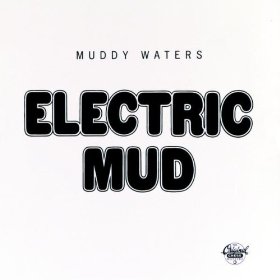
Electric Mud is the fifth studio album by Muddy Waters, with members of Rotary Connection playing as his backing band. Released in 1968, it presents Muddy Waters as a psychedelic musician. Producer Marshall Chess suggested that Muddy Waters record it in an attempt to appeal to a rock audience.
Cadet Records was an American record label that began as Argo Records in 1955 as the jazz subsidiary of Chess Records. Argo changed its name in 1965 to Cadet to avoid confusion with the similarly named label in the UK. Cadet stopped releasing records around 1974, when its artists were moved to Chess.

Rotary Connection was an American psychedelic soul band, formed in Chicago in 1966.

Moanin' in the Moonlight is a compilation album and the first album by American blues artist Howlin' Wolf, released by Chess Records in 1959. It contains songs recorded between 1951 and 1959 previously issued as singles, including one of his best-known, "Smokestack Lightning". Rolling Stone ranked it number 477 on its 2020 list of "the 500 Greatest Albums of All Time".

Phillip Upchurch is an American jazz and blues guitarist and bassist.
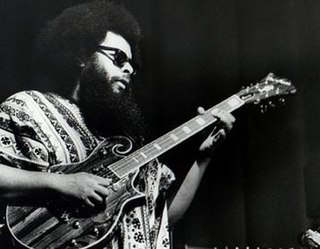
Peter Palus Cosey was an American guitarist who played with Miles Davis' band between 1973 and 1975. His fiercely flanged and distorted guitar invited comparisons to Jimi Hendrix. Cosey kept a low profile for much of his career and released no solo recorded works. He appeared on Davis's albums Get Up with It (1974), Agharta (1975), Pangaea (1976), Dark Magus (1977), and The Complete On the Corner Sessions (2007).
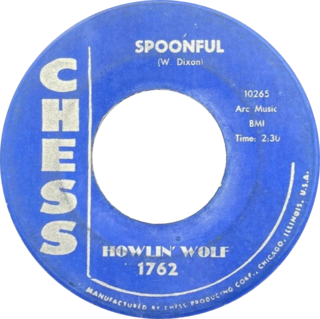
"Spoonful" is a blues song written by Willie Dixon and first recorded in 1960 by Howlin' Wolf. Called "a stark and haunting work", it is one of Dixon's best known and most interpreted songs. Etta James and Harvey Fuqua had a pop and R&B record chart hit with their duet cover of "Spoonful" in 1961, and it was popularized in the late 1960s by the British rock group Cream.

"Smokestack Lightning" is a blues song recorded by Howlin' Wolf in 1956. It became one of his most popular and influential songs. It is based on earlier blues songs, and numerous artists later interpreted it.

Marshall Chess is an American record producer, the son of Leonard Chess who co-founded Chess Records.

Rotary Connection is the debut album of the American psychedelic soul band Rotary Connection. It was released in 1968 on Cadet Concept Records. The album rose to No. 37 on the Billboard 200 chart.

"Evil", sometimes listed as "Evil (Is Going On)", is a Chicago blues song written by Willie Dixon. Howlin' Wolf recorded the song in Chicago for Chess Records in 1954. It was included on the 1959 compilation album Moanin' in the Moonlight. When he re-recorded it for The Howlin' Wolf Album in 1969, "Evil" became Wolf's last charting single, reaching number 43 Billboard R&B chart.
Charles Stepney was an American record producer, arranger, songwriter and musician. Stepney is noted for his work with artists such as The Dells, Ramsey Lewis, Rotary Connection and Earth, Wind & Fire.

After the Rain is the sixth studio album by Muddy Waters. It is the follow-up to the previous year's Electric Mud, and shares many of the same musicians. Unlike Electric Mud, After the Rain contained mostly Waters's own compositions; the songs, while still distorted, are less overtly psychedelic.

Fathers and Sons is the seventh studio album by the American blues musician Muddy Waters, released as a double LP by Chess Records in August 1969.
Morris Jennings was an American drummer and musician from Chicago. He recorded as Moe Jennings, M. Jennings, Maurice Jennings, Morris "Gator" Jennings, and Morris Jennings Jr.
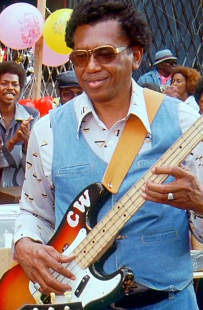
Calvin "Fuzz" Jones was an American electric blues bassist and singer. He worked with many blues musicians, including Muddy Waters, Howlin' Wolf, the Legendary Blues Band, Mississippi Heat, James Cotton, Luther "Guitar Junior" Johnson, Little Walter and Elmore James.
















